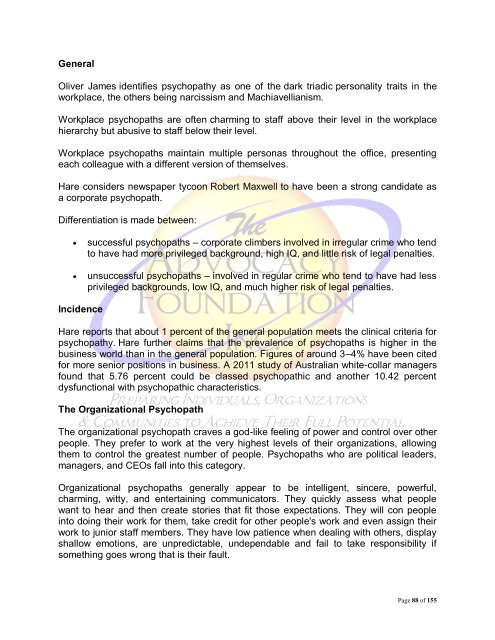Organizational Dysfunction
Organizational Dysfunction
Organizational Dysfunction
You also want an ePaper? Increase the reach of your titles
YUMPU automatically turns print PDFs into web optimized ePapers that Google loves.
General<br />
Oliver James identifies psychopathy as one of the dark triadic personality traits in the<br />
workplace, the others being narcissism and Machiavellianism.<br />
Workplace psychopaths are often charming to staff above their level in the workplace<br />
hierarchy but abusive to staff below their level.<br />
Workplace psychopaths maintain multiple personas throughout the office, presenting<br />
each colleague with a different version of themselves.<br />
Hare considers newspaper tycoon Robert Maxwell to have been a strong candidate as<br />
a corporate psychopath.<br />
Differentiation is made between:<br />
<br />
<br />
successful psychopaths – corporate climbers involved in irregular crime who tend<br />
to have had more privileged background, high IQ, and little risk of legal penalties.<br />
unsuccessful psychopaths – involved in regular crime who tend to have had less<br />
privileged backgrounds, low IQ, and much higher risk of legal penalties.<br />
Incidence<br />
Hare reports that about 1 percent of the general population meets the clinical criteria for<br />
psychopathy. Hare further claims that the prevalence of psychopaths is higher in the<br />
business world than in the general population. Figures of around 3–4% have been cited<br />
for more senior positions in business. A 2011 study of Australian white-collar managers<br />
found that 5.76 percent could be classed psychopathic and another 10.42 percent<br />
dysfunctional with psychopathic characteristics.<br />
The <strong>Organizational</strong> Psychopath<br />
The organizational psychopath craves a god-like feeling of power and control over other<br />
people. They prefer to work at the very highest levels of their organizations, allowing<br />
them to control the greatest number of people. Psychopaths who are political leaders,<br />
managers, and CEOs fall into this category.<br />
<strong>Organizational</strong> psychopaths generally appear to be intelligent, sincere, powerful,<br />
charming, witty, and entertaining communicators. They quickly assess what people<br />
want to hear and then create stories that fit those expectations. They will con people<br />
into doing their work for them, take credit for other people's work and even assign their<br />
work to junior staff members. They have low patience when dealing with others, display<br />
shallow emotions, are unpredictable, undependable and fail to take responsibility if<br />
something goes wrong that is their fault.<br />
Page 88 of 155

















